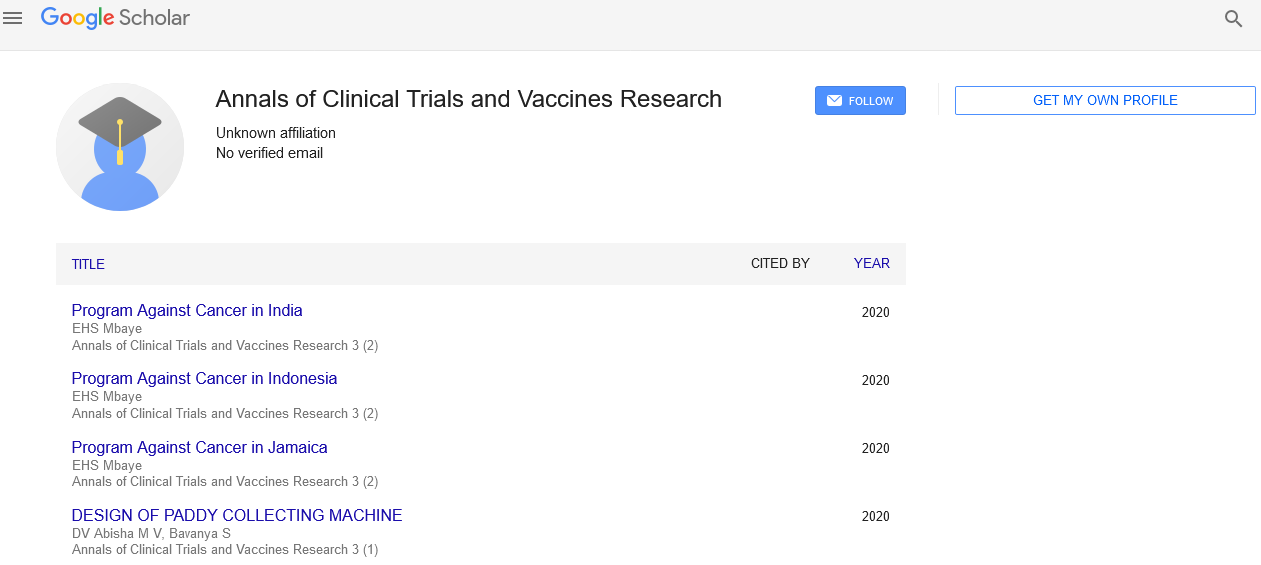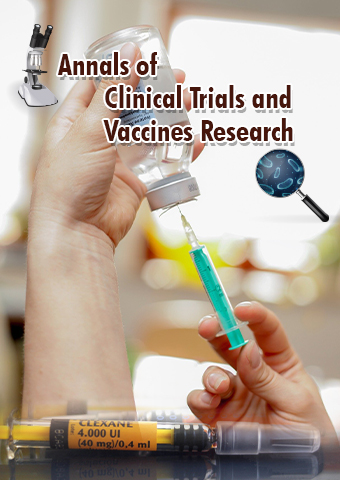Perspective - Annals of Clinical Trials and Vaccines Research (2024) Volume 14, Issue 2
Vaccines: The Cornerstone of Public Health in the 21st Century
- Corresponding Author:
- Ferochi Jamie
Department of Pharmacology,
University of Kinabatangan,
Kinabatangan,
Malaysia
E-mail: Feroch@83gmail.com
Received: 26-Mar-2024, Manuscript No. ACTVR-24-130523; Editor assigned: 29-Mar-2024, Pre QC No. ACTVR-24-130523 (PQ); Reviewed: 12-Apr-2024, QC No. ACTVR-24-130523; Revised: 23-Apr-2024, Manuscript No. ACTVR-24-130523 (R); Published: 30-Apr-2024, DOI: 10.37532/ ACTVR.2024.14(2).210-211
Introduction
In the vast landscape of modern medicine, few interventions have had as profound an impact on global health as vaccines. From the eradication of once-deadly diseases to the prevention of countless infections, vaccines stand as a testament to human ingenuity and scientific progress. In this article, we will explore the multifaceted world of vaccines, delving into their history, mechanisms, controversies, and the pivotal role they play in safeguarding public health.
Description
A journey through time: The evolution of vaccines
Vaccination, the process of administering a vaccine to stimulate the immune system’s production of antibodies, has been practiced for centuries. The origins of vaccines can be traced back to ancient civilizations, where variolation, the deliberate inoculation of smallpox, was practiced in China and India. However, it was not until the pioneering work of Edward Jenner in the late 18th century that modern vaccination as we know it began to take shape. Jenner’s discovery of the smallpox vaccine laid the foundation for the eradication of one of the most devastating diseases in human history.
The science behind vaccines: How they work
Vaccines work by mimicking the infectious agent they are designed to protect against, triggering an immune response without causing the disease itself. This immune response primes the body to recognize and combat the pathogen in the event of future exposure, effectively conferring immunity. Various types of vaccines exist, including live attenuated vaccines, inactivated vaccines, subunit vaccines, and mRNA vaccines, each with its own unique mechanism of action and advantages.
Conquering disease: Success stories and milestones
The impact of vaccines on public health cannot be overstated. From the eradication of smallpox in 1980 to the near-elimination of diseases like polio, measles, and rubella in many parts of the world, vaccines have been instrumental in preventing illness, reducing mortality, and improving quality of life. Vaccination campaigns have saved millions of lives and transformed the global health landscape, paving the way for progress in areas such as maternal and child health, infectious disease control, and pandemic preparedness.
Facing challenges: Debunking myths and overcoming hesitancy
Despite their undeniable benefits, vaccines have faced skepticism, misinformation, and outright opposition from various quarters. Vaccine hesitancy, fueled by misconceptions about safety, efficacy, and necessity, poses a significant barrier to achieving widespread immunization coverage. Addressing vaccine hesitancy requires a multifaceted approach, including public education, transparent communication, and community engagement to build trust and confidence in vaccines and the healthcare system.
Ethical considerations: balancing individual rights and public health
The issue of vaccine mandates and compulsory vaccination policies raises complex ethical questions regarding individual autonomy, personal freedom, and the collective responsibility to protect public health. While vaccines have been a cornerstone of disease prevention and control, the implementation of vaccine mandates has sparked debates over the balance between individual rights and the greater good. Striking the right balance requires careful consideration of ethical principles, scientific evidence, and societal values.
Innovations and advances: The future of vaccinology
The field of vaccinology continues to evolve rapidly, driven by advancements in science, technology, and biotechnology. Emerging vaccine platforms, such as mRNA vaccines, offer new possibilities for rapid vaccine development and customization, as demonstrated by their pivotal role in the response to the COVID-19 pandemic. Additionally, research into therapeutic vaccines for cancer, infectious diseases, and chronic conditions holds promise for revolutionizing disease treatment and management.
Global health equity: Ensuring access for all
Access to vaccines remains a critical issue, with disparities in immunization coverage persisting between and within countries. Achieving vaccine equity requires addressing barriers to access, including poverty, inadequate healthcare infrastructure, and vaccine supply shortages. Collaborative efforts between governments, international organizations, philanthropic foundations, and the private sector are essential for expanding vaccine access and closing the immunization gap.
Pandemic preparedness: Lessons learned and future challenges
The COVID-19 pandemic has underscored the importance of robust pandemic preparedness and response mechanisms. While the rapid development and deployment of COVID-19 vaccines have been a testament to scientific innovation and collaboration, the pandemic has also exposed vulnerabilities in global health systems and highlighted the need for greater investment in pandemic preparedness, surveillance, and research. Moving forward, strengthening global health security will require sustained investment, coordination, and solidarity.
Conclusion
Vaccines have transformed the trajectory of human health, saving lives, preventing suffering, and advancing progress towards a healthier, more resilient world. As we navigate the complexities of the 21st century, vaccines remain a cornerstone of public health, offering hope in the face of emerging threats and challenges. By harnessing the power of science, innovation, and collaboration, we can build a future where preventable diseases are consigned to the annals of history, and every individual has access to the life-saving benefits of vaccination.

